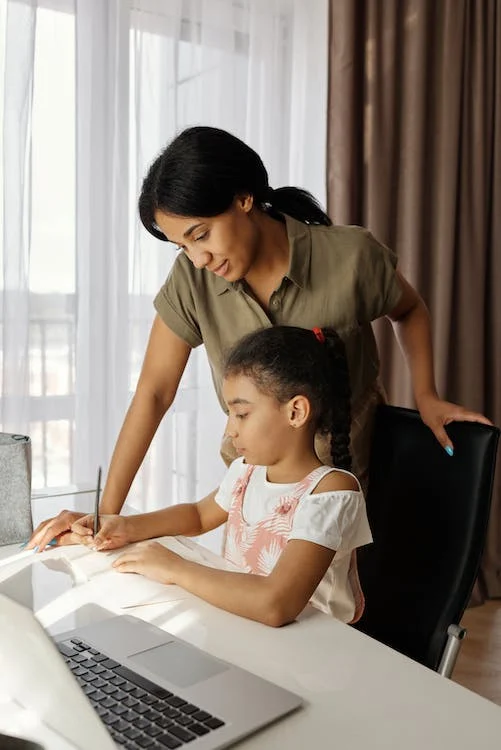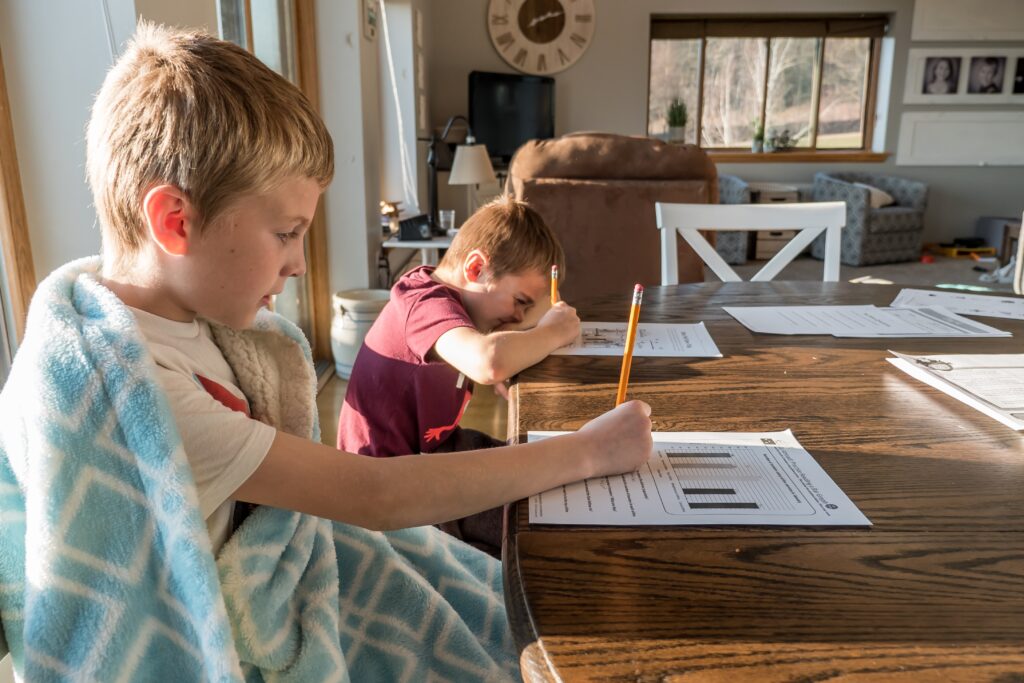Homeschooling has its benefits but it is certainly not a bed of roses. Bearing the burden of educating your child yourself can be overwhelming and intimidating. And when you add an easily distracted learner to the mix, the task is made even more exigent.
Homeschooling has made giant strides over the years. What started as a way for catholic school parents to instill their religious perspectives into education back in the late 80s has grown to become a fully-fledged system of education.
Despite this remarkable growth, there are still some concerns surrounding homeschooling, especially from parents that do not quite understand the merits of homeschooling.
Homeschooling in the wake of distractions
Is your child easily distracted during homeschooling? If your child suffers from little to no attention span, it can be a hurdle trying to make them feel interested in their studies. Distractions are expected when teaching any children, whether homeschooled or not.
However, these distractions are often magnified when learning from home as a result of several things including pets, games, and toys and so on. The good news is that no one has all the answers- even the most qualified teacher will struggle with students that have a hard time concentrating.
According to Kate Huber of NJGamblingFun, ‘’as I sit and take a look back when I debated the merits of homeschooling, I can explain to you every little fear that I had. It made things worse than family members and friends also had opinions about why it would never work. However, if you are sitting at home wondering, ‘should I really homeschool my child’, then the answer is yes. You absolutely should!’’
As a homeschooling parent, you do not have to be an expert, even though it can often feel like you ought to be well versed in everything. On some days, your kids will knock out all their tasks quickly but on others, they will struggle, which is quite normal.
The upside of homeschooling your children is that you have the option to decide whether to push forward with the day when concentration becomes an issue or take a break and make up for the difference the next day.
On those days when you have a hard time keeping your kids focused, here are some things that you can try to improve their concentration:
1. Invest in manipulatives
Easily distracted learners can make you want to pull your hair out. And while numerous techniques can be utilized to keep up with a distracted learner, one of the best ways is to use manipulatives. For some students, learning is experiential, meaning that active involvement in the subject being taught can help to enhance the student’s experience and learning.
But what exactly amounts to a manipulative? Ideally, anything that your learner can touch, feel, move or interact with can fall under a manipulative. Sensory tools like balancing discs and balls can help to improve concentration.
Some homeschooling parents also swear by fidget spinners and vibrating therapy pillows. Please note that while one manipulative may work for one child, it may be useless for another. As such, experiment as much as you can to find the right manipulative for your situation. Also consider developing a hobby for your homeschooler as well.
2. Try not to rush the process
If your child is having issues focusing, it may be because you are rushing through the teaching process, which could create even more struggles ahead. Furthermore, rushing, especially through the basics, can take all the fun away from reading or writing. The best thing that you can do is lead the learner gently with lots of playful explorations that can help to keep them occupied.
Take the time to figure out the things that interest your child and then give them the freedom to explore these things. Once he or she identifies the area of learning that interests them, you will soon start to see a difference in the way they approach work. Before you know it, your kids will be teaching you things that you may not even know yourself, simply because they learned themselves.
3. Give the learner brain breaks
Breaks and playtime might seem counter intuitive at first, but short breaks in between lessons or topics can help to revive one’s concentration. Learning and schoolwork can get mentally exhausting so you must allow your child to take breaks now and then. As a matter of fact, schools today are adding more recesses to the schedule throughout the day owing to the associated benefits.
Rather than continue to sit for hours on end, give your kid a 15-minute break after every 30 to 45 minutes of work. The break and how long it will last depends on you and it can consist of anything from playing outside to running around the house. These breaks will refill their cup and allow them to return to the learning process ready to concentrate.
4. Try and get rid of any distractions
To avoid losing your child to distractions, one of the first things you can do to remedy the situation is to remove what is distracting your child from the vicinity in the first place. Though things such as posters and visual reminders can be useful, they can also be overwhelming to a learner. Therefore, consider eliminating these things to see if things improve.
If there is a lot of noise from your house either from siblings or pets, it might help to set up a secluded area where learning can occur. If you are dealing with limited space, something like a room divider can also come in handy.
5. Switch it up
If your kid is having concentration issues, your delivery may be the problem. Doing the same things repeatedly can become boring, especially when there is learning involved. Sometimes homeschooled kids have trouble focusing because you may be teaching in a manner that does not suit their learning style.
For instance, some students thrive with a little structure, while others learn best solo. As such, try and learn about as many different homeschooling styles as you can. If you change up your approach, it may catch your student off guard and gain their attention.
Other Methods for Maintaining Your Child’s Attention While Homeschooling Them
Have a Location Devoted to Learning
Homeschooling is an enjoyable, engaging, and frequently messy way to educate children. Living and attending school in the same building can very rapidly result in disarray and confusion, and it is not an ideal setting for the development of contented pupils.
You may steer clear of confusion by maintaining order in your children’s school supplies and by creating a dedicated learning center for them, a location in which they can store their books and resources.
Even if your children wind up doing their homework at the dining room table, it is still beneficial to keep all of their belongings organized in a single location. Instruct them to place their belongings in the area allotted to them once they have completed their education and are done.
Give Your Child Participation in the Decision-Making Process
Your children will be more cooperative and invested in their education if they are given a say in some of the activities in which they participate.
Establish a Separate Study Space
Motivating factors can be as simple as allowing your child to leave the study area for short periods. This space can be used at various times during the day, and as your child walks to the next place, it provides a change of view as well as a little mental breather.
Play Games
This one is pretty self-explanatory, but each time you can add games into your child’s homeschooling, they will be more motivated. Your child won’t even realize they’re picking up new abilities if you teach them through fun activities like games. Because there are currently so many educational games available, it is possible to discover a game on practically any subject.
Utilize Brief Lessons
When it comes to length, shorter is better. Do not anticipate that a youngster who struggles to maintain attention will be able to sit through a lengthy and drawn-out lesson. The youngster can learn more quickly and retain the information they have learned if they are only exposed to it for brief periods.
Celebrate Accomplishments
Consider it a victory and reward your child on their hard work if they can finish an assignment with only a minimal amount of attention loss. This might be something as straightforward as some free time, a snack, some time spent playing on the computer, or even just some hugs and high-fives.
By eliciting a positive response to their achievement, you increase the likelihood that they will seek to recreate the same sensation with their subsequent attempt.
Music
Try to listen to instrumental music that has a beat that is either rhythmic or comforting. This can cause the brain to focus more clearly since it has something to keep it busy while the child is working on what you’ve given them to do. As the child is working, you can focus on what you’ve given them to accomplish.
Steer Out of the Rabbit Hole
A child that is easily distracted may oftentimes just start a conversation about something completely unrelated to the topic at hand. It turns into an obsessional topic that people want to talk about in-depth exactly at that moment. You may either try to find a method to steer the conversation back to the issue at hand or you can make a mental note of the subject and promise to discuss it once the time allotted for learning has passed.
Engage in Light Exercise before Starting
Children who engage in physical activity for some time before they need to concentrate are more successful academically. Before you start work for the day, get your morning workout in by using gym equipment, going for a run around the yard or up and down the stairs, or engaging in any of your other preferred early-morning physical activities.
Finding the answer that will be the most beneficial to you might be a genuine challenge. If your learner is often distracted, you might want to combine a number of these strategies and discover which are most effective for your homeschool.
Do One-on-One Learning
If your child is easily distracted, they will likely perform better in an environment in which they are receiving attention rather than in a setting in which they are learning by themselves, in which it is simpler for them to allow their minds or bodies to wander without being noticed. Your child will be more likely to pay attention to what they are supposed to be doing if you sit them down next to you and guide them through their learning experience.
Alternate Delivery
Doing an activity over and over again might become tedious. Alter the curriculum daily to throw off your child’s expectations, surprise them, and grab their attention.
Establish Joint Learning Objectives
If you choose to teach your child at home, they will have the option to take charge of their education and tailor it to their specific interests. The accomplishment of one’s goals is a significant component of that process. It is far more probable that you will be successful in achieving those learning outcomes and will be able to correctly align your day-to-day curriculum when you have a clear vision and a well-thought-out plan for where you want to go.
Outline some major learning goals for your child in advance as the parent or teacher in charge of their education. These will likely be based on the standards of the state or the nation, as well as your educational philosophy, your child’s age, and talents.
Sit down with your child after you’ve established some general goals and benchmarks and ask for their perspective on the matter. Collaborate to define your educational objectives and break them down into annual, semester, and monthly milestones. This is also a wonderful time for you to educate your youngster on the art of goal-setting as well as on the finest methods to use.
Final Thoughts
If you are thinking about homeschooling your kids, there may be some trepidation regarding the entire process. However, homeschooling makes a lot of sense for many reasons. Not only do homeschooled children perform better academically, but they are also more likely to succeed after college. If these few reasons are not sufficient to change your mind, then what is?




